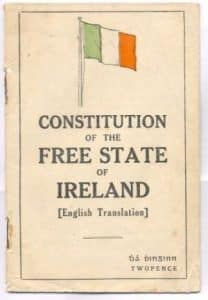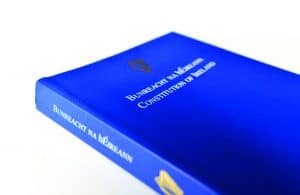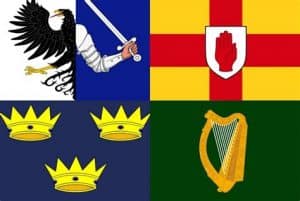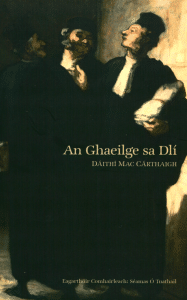Irish is experiencing a period of growth in its official use. It is a full official and working language of the European Union since 1 January 2022. Every regulation, directive and decision of the EU is now enacted and published in Irish at the same time and with the same status as the versions in the other 23 official languages of the Union, from world languages such as English, French and German to the languages of small nations such as Maltese, Estonian and Latvian.
At national level, the Official Languages Act has been amended and the amending legislation signed into law by the President. The most noteworthy amendments provide that at least 20% of new recruits to the public service will be competent in Irish by the 31 December 2030 and that public services will be provided in Irish in Gaeltacht areas. At least 20% of public bodies’ advertising will be in Irish and at least 5% of their advertising budgets spend on Irish language media. Public bodies will facilitate the use of the síneadh fada. Bilingual logos, bilingual forms and bilingual advertising materials will be rolled out for public bodies. Protocols or ‘standards’ will be set in relation to services to be provided in Irish by public bodies, including services provided on their behalf by private agencies.
Long-promised language legislation is being enacted at Westminster for Northern Ireland which will establish the office of Irish Language Commissioner and language standards for the provision of public services through Irish.
In this context of growth, one must be watchful to ensure that the official status of Irish is safeguarded under any new constitutional arrangement. The status of Irish is secure at EU level and must be reproduced domestically. In the context of a united Ireland, the protection of minority rights will be very much to the fore, including the rights of Irish speakers. In relation to protecting linguistic minorities, Canadian constitutional law and language legislation, in particular the Canadian Charter of Rights and Freedoms provides a useful exemplar. This is set out and discussed below.
Irish as the Premier Official Language
From the foundation of the State, Irish is established as the national language of the country and from 1937, with the enactment of Bunreacht na hÉireann, as the first official language because it is the national language. There is a divergence between the Irish and English texts of Article 8.1. In cases such as this, the Irish version, under Article 25.5.4°, prevails. In the English version Irish is the “first official language”. In the Irish version it is the “príomhtheanga oifigiúil” i.e. the premier or main official language.
It matters not that this is more honoured in the breach than the observance. Very few laws are constantly observed but this does not nullify the constitutional imperative which flows from Article 8.1. Consider that equality as between citizens was guaranteed from 1937 by Article 40 of the Irish Constitution, but that the marriage-bar which obliged women to resign from state employment in the event that they married persisted until 1973 and that discriminatory practise was only ended under the shadow of European law.
Similarly, it is because of this constitutional status and the constitutional imperative which flows from it that any victory for Irish language rights has been secured in the Courts. Anyone who proposes a reduction in the status of the language does not have the good of Irish at heart or is unfamiliar with the caselaw.
The Constitution of the Irish Free State 1922
Article 4 of the 1922 Constitution provided as follows:
The National language of the Irish Free State (Saorstát Éireann) is the Irish language, but the English language shall be equally recognised as an official language. Nothing in this Article shall prevent special provisions being made by the Parliament of the Irish Free State (otherwise called and herein generally referred to as the “Oireachtas”) for districts or areas in which only one language is in general use.
A derogation from official bilingualism was permitted at the end of Article 4 “to provide for the contingency of the entry of Northern Ireland into the Free State” according to Kohn The Constitution of the Irish Free State (London 1932), p. 124. This, of course, is being superseded by the aforementioned UK language legislation for the North. Language matters are also discussed in Article 42:
As soon as may be after any law has received the King’s assent, the clerk, or such officer as Dáil Éireann may appoint for the purpose, shall cause two fair copies of such law to be made, one being in the Irish language and the other in the English language (one of which copies shall be signed by the Representative of the Crown to be enrolled for record in the office of such officer of the Supreme Court as Dáil Éireann may determine), and such copies shall be conclusive evidence as to the provisions of every such law, and in case of conflict between the two copies so deposited, that signed by the Representative of the Crown shall prevail.
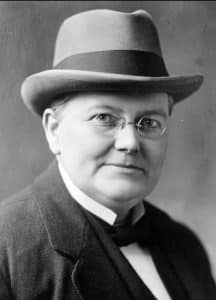
There are a number of ways to read this provision. According to Hugh Kennedy, the first Chief Justice, in the case of Ó Foghludha v. McClean [1934] I.R. 469 bilingual enactment is implied by this Article:
It is not for me here and now to express any opinion as to whether each Act should not have been enacted at the same time in the Irish language (as seems to be suggested by Article 42 of the Constitution). No doubt an Irish translation of each Act has been prepared subsequently and published officially but such translation has no effect as legislation, there being no power under the Constitution to delegate the legislative power of the Oireachtas to a staff of translators. I may add that legislation in two official languages concurrently is the settled practice elsewhere.
The learned Chief Justice referred in particular in support of this contention to the practice of bilingual enactment in other bilingual common law jurisdictions:
[T]he Dominion of Canada and the Union of South Africa, made provision for equality for official purposes, in the case of Canada and its Province of Quebec, as between the English and French languages (British North America Act, 1867, sect. 133); in the case of South Africa, as between the English and Dutch languages (South Africa Act, 1909, sect. 137).
Bunreacht na hÉireann 1937
Article 8 of the Constitution provides as follows:
| 1. Ós í an Ghaeilge an teanga náisiúnta is í an phríomhtheanga oifigiúil í.
2. Glactar leis an Sacs-Bhéarla mar theanga oifigiúil eile. 3. Ach féadfar socrú a dhéanamh le dlí d’fhonn ceachtar den dá teanga sin a bheith ina haonteanga le haghaidh aon ghnó nó gnóthaí oifigiúla ar fud an Stáit ar fad nó in aon chuid de.
|
1 The Irish language as the national language is the first official language.
2 The English language is recognised as a second official language. 3 Provision may, however, be made by law for the exclusive use of either of the said languages for any one or more official purposes, either throughout the State or in any part thereof. |
Apart from the linguistic divergence in Article 8.1 as discussed above, in Article 8.2 English is accepted (‘glactar leis’) as another official language (‘teanga oifigiúil eile’) in the Irish version. The English version is less ungenerous, but ungenerous none the less with English being ‘recognised as a second official language’.
The premier status of Irish in Article 8.1 gives rise to the constitutional imperative on which language rights for Irish speakers have been recognised by the Courts e.g. the right to use Irish before the courts and other tribunals independent of one’s knowledge of English (An Stát (Mac Fhearraigh) v. Mac Gamhnia (1983) T.É.T.S. 29) or the duty on the State to make all reasonable efforts to ensure that an Irish speaker is tried before a district court judge who can understand Irish without an interpreter (Ó Cadhla v. An tAire Dlí agus Cirt [2019] IEHC 503). It is noteworthy that the hole in the doughnut is larger in Article 8.3 than in the old Article 4, although no such legislation has ever been enacted pursuant to its provisions.
Matters legislative and linguistic arise in Article 25 where ss.4.4° and 6° provide:
| 4° i gcás an tUachtarán do chur a láimhe le téacs Bille i dteanga de na teangacha oifigiúla agus sa teanga sin amháin, ní foláir tiontú oifigiúil a chur amach sa teanga oifigiúil eile.
6° i gcás téacs Gaeilge agus téacs Sacs-Bhéarla de dhlí a chur isteach ina n-iris faoin alt seo agus gan an dá théacs sin a bheith de réir a chéile, is ag an téacs Gaeilge a bheidh an forlámhas.
|
4° Where the President signs the text of a Bill in one only of the official languages, an official translation shall be issued in the other official language.
6° In case of conflict between the texts of a law enrolled under this section in both the official languages, the text in the national language shall prevail.
|
Both bilingual and mono-lingual enactment of Bills is envisaged as long as an official translation is issued in the other official language in the case of mono-lingual enactment. It is not clear however that mono-lingual enactment in English only is envisioned. It is difficult to square the practice of English-only Bills making their way through the Houses of the Oireachtas with the status of Irish as the main or premier official language of the State. This is now thrown into sharp relief with EU legislation progressing through the European Parliament in 24 official language versions, including Irish.
In relation to the text of the Constitution itself, Article 25.5.4° provides for the supremacy of the Irish version, which is on all fours with the language’s status as the primary official language:
| 4° i gcás gan na téacsanna d’aon chóip áirithe den Bhunreacht seo a bheidh curtha isteach ina hiris faoin alt seo a bheith de réir a chéile, is ag an téacs Gaeilge a bheidh an forlámhas.
|
4° In case of conflict between the texts of any copy of this Constitution enrolled under this section, the text in the national language shall prevail |

The language regime of the European Union
Irish is a full official and working language of the European Union since 1 January 2022. All EU laws (regulations, directives, decisions) are enacted and published in the Union’s 24 official languages, including Irish, simultaneously which practice gives Irish the de facto status as an official language.
Council Regulation No. 1 of 1958, the first regulation made by the EEC/EU, deals with the subject of official languages. One cannot, of course, undertake any agenda in a multilingual context without first dealing with the question of official languages. Regulation 1/1958, as amended, now provides as follows. Emphasis is added:
Article 1: The official languages and the working languages of the institutions of the Union shall be Bulgarian, Croatian, Czech, Danish, Dutch, English, Estonian, Finnish, French, German, Greek, Hungarian, Irish, Italian, Latvian, Lithuanian, Maltese, Polish, Portuguese, Romanian, Slovak, Slovenian, Spanish and Swedish.
Article 2: Documents which a Member State or a person subject to the jurisdiction of a Member State sends to institutions of the Community may be drafted in any one of the official languages selected by the sender. The reply shall be drafted in the same language.
Article 3: Documents which an institution of the Community sends to a Member State or to a person subject to the jurisdiction of a Member State shall be drafted in the language of such State.
Article 4: Regulations and other documents of general application shall be drafted in the official languages.
Article 5: The Official Journal of the European Union shall be published in the official languages.
Article 6: The institutions of the Community may stipulate in their rules of procedure which of the languages are to be used in specific cases.
Article 7: The languages to be used in the proceedings of the Court of Justice shall be laid down in its rules of procedure.
Article 8: If a Member State has more than one official language, the language to be used shall, at the request of such State, be governed by the general rules of its law.
Regarding Article 7, judgements of the CJEU are published in all official languages.
From the point of view of principle and practice, this is the new floor, the new baseline in relation to any proposed amendment of Article 8 of the Constitution under any new constitutional arrangement. The Irish language cannot have lesser status domestically than it has at EU level.
It should be remembered that EU law is part of national law in that it is enforced in Irish Courts. It is also of great advantage to the Irish State and its bureaucracy that Irish has this status as it is an imperative of Government policy to increase the number of Irish nationals working in EU Institutions. An applicant for any position with the EU bureaucracy must demonstrate competence in two official languages. A third language is needed to obtain a promotion. Irish being an official EU language facilitates Irish applicants for such positions as a knowledge of Irish can be cited. Furthermore, many Irish language experts, who begin their careers as translators or lawyer-linguists, progress to policy areas such as agriculture or transport, which further increases Ireland’s social capital at Union level.
Canadian Charter of Rights and Freedoms
The sections of the Canadian Charter of Rights and Freedoms which deal with language rights in that country are set out below. The Charter is a bill of rights entrenched in the Constitution of Canada, forming the first part of the Constitution Act 1982.
OFFICIAL LANGUAGES OF CANADA
- (1) English and French are the official languages of Canada and have equality of status and equal rights and privileges as to their use in all institutions of the Parliament and government of Canada.
(2) English and French are the official languages of New Brunswick and have equality of status and equal rights and privileges as to their use in all institutions of the legislature and government of New Brunswick.
(3) Nothing in this Charter limits the authority of Parliament or a legislature to advance the equality of status or use of English and French.
16.1(1) The English linguistic community and the French linguistic community in New Brunswick have equality of status and equal rights and privileges, including the right to distinct educational institutions and such distinct cultural institutions as are necessary for the preservation and promotion of those communities.
(2) The role of the legislature and government of New Brunswick to preserve and promote the status, rights and privileges referred to in subsection (1) is affirmed.
- (1) Everyone has the right to use English or French in any debates and other proceedings of Parliament.
(2) Everyone has the right to use English or French in any debates and other proceedings of the legislature of New Brunswick
- (1) The statutes, records and journals of Parliament shall be printed and published in English and French and both language versions are equally authoritative.
(2) The statutes, records and journals of the legislature of New Brunswick shall be printed and published in English and French and both language versions are equally authoritative.
- (1) Either English or French may be used by any person in, or in any pleading in or process issuing from, any court established by Parliament.
(2) Either English or French may be used by any person in, or in any pleading in or process issuing from, any court of New Brunswick.
- (1) Any member of the public in Canada has the right to communicate with, and to receive available services from, any head or central office of an institution of the Parliament or government of Canada in English or French, and has the same right with respect to any other office of any such institution where
(a) there is a significant demand for communications with and services from that office in such language; or
(b) due to the nature of the office, it is reasonable that Communications with and services from that office be available in both English and French.
(2) Any member of the public in New Brunswick has the right to communicate with, and to receive available services from, any office of an institution of the legislature or government of New Brunswick in English or French.
- Nothing in sections 16 to 20 abrogates or derogates from any right, privilege or obligation with respect to the English and French languages, or either of them, that exists or is continued by virtue of any other provision of the Constitution of Canada.
- Nothing in sections 16 to 20 abrogates or derogates from any legal or customary right or privilege acquired or enjoyed either before or after the coming into force of this Charter with respect to any language that is not English or French.
Minority Language Educational Rights
Language of instruction
23 (1) Citizens of Canada
(a) whose first language learned and still understood is that of the English or French linguistic minority population of the province in which they reside, or
(b) who have received their primary school instruction in Canada in English or French and reside in a province where the language in which they received that instruction is the language of the English or French linguistic minority population of the province,
have the right to have their children receive primary and secondary school instruction in that language in that province.
Continuity of language instruction
(2) Citizens of Canada of whom any child has received or is receiving primary or secondary school instruction in English or French in Canada, have the right to have all their children receive primary and secondary school instruction in the same language.
Application where numbers warrant
(3) The right of citizens of Canada under subsections (1) and (2) to have their children receive primary and secondary school instruction in the language of the English or French linguistic minority population of a province
(a) applies wherever in the province the number of children of citizens who have such a right is sufficient to warrant the provision to them out of public funds of minority language instruction; and
(b) includes, where the number of those children so warrants, the right to have them receive that instruction in minority language educational facilities provided out of public funds.
(Section 23(1)(a) is not in force in Quebec).
[Emphasis added]
Proposal for a new Article 8
Based on and arising out of the above, as well as Irish and Canadian language legislation, the following is proposed as a new Article 8, suitable for a new All-Ireland arrangement, founded inter alia on protection for minority rights:
Official Languages
8.1.1° The Irish language as the national language is the first official language.
8.1.2° Irish and English are the official languages of the State.
8.1.3° The Irish nation cherishes the cultural importance both hereditary and current of the variety of the Scots language spoken in the province of Ulster.
8.1.4° The Irish nation cherishes multilingualism in the context of the State’s membership of the European Union.
8.1.5° The Irish nation cherishes pluralism and the cultural and linguistic richness of communities in Ireland which have immigrant backgrounds.
8.1.6° The Oireachtas shall pass legislation to provide for the recognition of Irish Sign Language, to lay down principals to vindicate the rights of its users to use it when interacting with public bodies and in legal proceedings, to make adequate provision for education in Irish Sign Language and for its being taught as of right to hearing impaired children and their carers, for the use of Irish Sign Language in the media, and to provide for related matters.
Houses of the Oireachtas
8.2.1° Every person shall have the right to speak and use either official language in any proceedings of the Houses of the Oireachtas or any House thereof, including their committees and joint-committees, and simultaneous interpretation services shall be provided from one official language into the other.
8.2.2° Every official report of the proceedings of the Houses of the Oireachtas and each House thereof shall be published in each of the official languages simultaneously.
8.2.3° The Order of Business of each House of the Oireachtas and the Official Gazette, an Iris Oifigiúil, shall be printed and published in both official languages simultaneously and both language versions shall be equally authoritative.
Legislation
8.3.1° Every Bill and Act of the Oireachtas shall be enacted, printed and published in both official languages simultaneously and both language versions shall be equally authoritative.
8.3.2° Every statutory instrument made pursuant to the authority conferred by an Act shall be made, printed and published in both official languages simultaneously and both language versions shall be equally authoritative
8.3.3° The Government shall take all possible steps to ensure that any treaty or convention between Ireland and another state or states is authenticated in both official languages.
The Courts
8.4.1° A person may use either of the official languages before any court or any tribunal which has the power according to law to settle rights and liabilities or make findings of fact, including pleadings, evidence, written and oral submissions and orders.
8.4.2° In criminal and civil proceedings before any court or any tribunal which has the power according to law to settle rights and liabilities or make findings of fact, the State and all emanations of the State shall use in the proceedings the official language chosen by the other party; where the parties in the case which are not emanations of the State are not proceeding in the same official language, the State or the emanation of the State shall use the official language which it is reasonable to use under the circumstances.
8.4.3° In criminal and civil proceedings before any court or any tribunal which has the power according to law to settle rights and liabilities or make findings of fact, that court or tribunal must be competent to understand without an interpreter the official languages chosen by the parties in the case except where the Supreme Court sits as a full court with all of its members.
8.4.4° The judgement of any court or tribunal which has the power according to law to settle rights and liabilities or make findings of fact shall be published in the official languages used by the parties in the case. It is permissible to publish an official translation of a judgment where it is of general public importance or for other good reason. Every judgment of the Supreme Court which is of general public importance must be published in both official languages and both language versions shall be equally authoritative.
Access to State services
8.5.1° Every person has the right to communicate with every head-office of every emanation of the State and every agent providing services on behalf of that head office and to receive services from that office or agent in Irish or in English as that person so desires.
8.5.2° Every person has the right to communicate with every other office of every emanation of the State and every agent providing services on behalf of that office and to receive services from that office or agent in Irish or in English as that person so desires where there is a significant demand for services in that language from that office or where it is reasonable that services in that language be available from that office arising from the nature of that office.
8.5.3° Where a person communicates in writing, by electronic mail or through social media in an official language with an emanation of the State or an agent providing services on its behalf, the emanation of the State or its agent shall reply in the same language.
8.5.4° Documents of general application published by or on behalf of emanations of the State shall be drawn up and published in both official languages simultaneously.
8.5.5° Websites of every emanation of the State shall be in both official languages.
Education
8.6.1° It is the right of every child of school-going age that he or she be taught the official languages of the State in an effective manner.
8.6.2° It is the right of every parent that their children be provided with free education in schools in which the national curriculum is delivered and all teaching is carried out in the school through the medium of Irish, and where Irish is the language of work and internal administration of the school and of its support services without prejudice to the best practice of teaching English and foreign languages through the target language, where there is a sustainable demand for such a school locally.
8.6.3° It is the right of every parent that their children be provided with free education in schools in which the national curriculum is delivered and all teaching is carried out in the school through the medium of English, and where English is the language of work and internal administration of the school and of its support services without prejudice to the best practice of teaching Irish and foreign languages through the target language, where there is a sustainable demand for such a school locally.
This is not an agenda to restore the Irish language but rather an agenda based on protection of minorities and language rights. An agenda to restore Irish would call for the example of Catalonia to be followed where Catalan became the working language of the home-rule parliament rather than Spanish although Catalan had become a minoritised language locally. Language shift comes from the top down.
Dáithí Mac Cárthaigh is a practising barrister, Law and Irish academic co-ordinator at King’s Inns, the author of the seminal book An Ghaeilge sa Dlí (Leabhar Breac) and co-author of Essentials of Irish Law (Claris Press).


